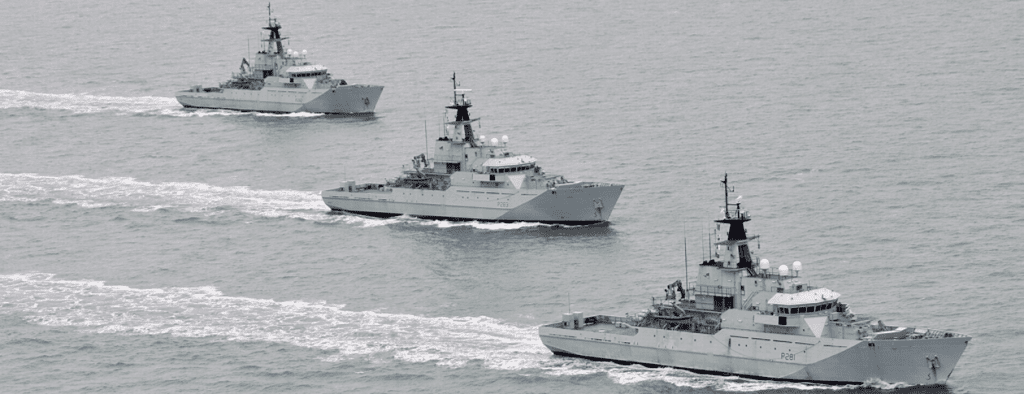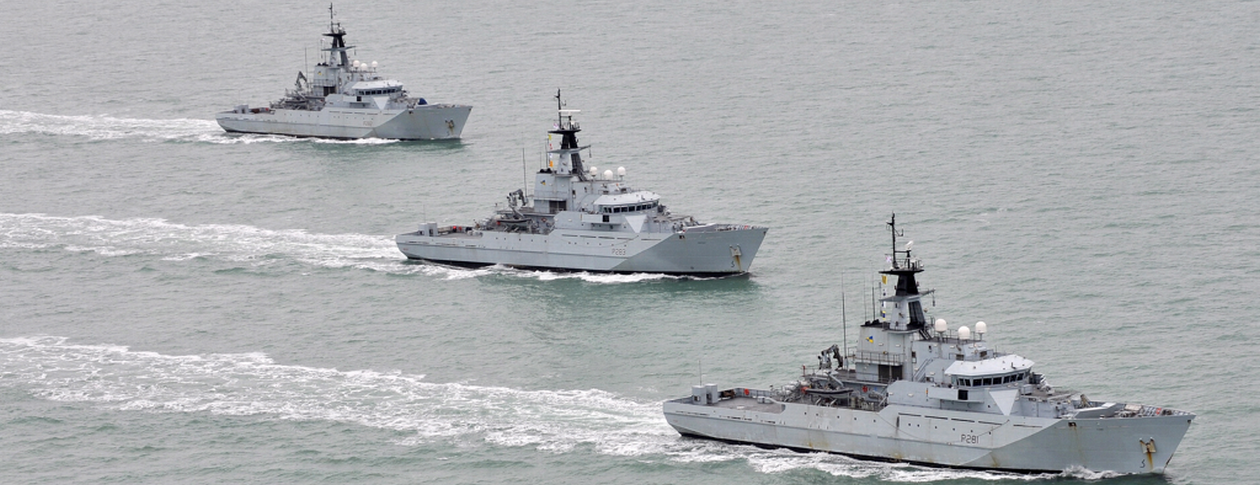By Timothy Edmunds and Barry J. Ryan
The politics of Britain’s security after Brexit are contentious and fast moving. But most discussion has focused on the security of land. The security of the sea has received less attention.

As a nation of islands, maritime security is of critical importance to the United Kingdom. The UK marine area comprises 298 thousand square miles. Including the UK’s Search and Rescue Zone, which stretches deep into the Atlantic, the area of responsibility exceeds 2 million square miles. In addition, it has an overseas marine area of 2.3 million square thousand miles. At any time there are 1500 large commercial ships off the coast of the UK. The UK has considerable infrastructure in these spaces; including oil rigs, fish farms and wind farms, in addition to seven coastal nuclear power stations, a complex nest of underwater cables and 120 commercial shipping ports. Potential security challenges abound, including the prospect of a terrorist attack on shipping, human trafficking, disruptions to maritime traffic, attacks on maritime infrastructure, and the transportation of illegal drugs, arms, or weapons of mass destruction.
In addition, Brexit could see restrictions on EU fishing vessels in its exclusive economic zone if European collective maritime governance institutions either cease to exist or change dramatically. Such changes could create new demands on the UK to police its waters against illegal fishing and could result in new threats to public order at sea, such as conflicts between British trawlers and fishing vessels from neighbouring states.
Yet, while the UK remains a major naval power, its independent capacities for maritime security outside of the EU are underdeveloped. As late as November 2017, Lord West of Spithead decried the “dreadful hotchpotch of vessels involved” in UK maritime security and called on Parliament to improve capacity in this area.
It is not all bad news. The UK published a National Strategy for Maritime Security in 2014. It also established a National Maritime Information Centre in 2010 to build surveillance and expertise around maritime risks and a Joint Maritime Operations Coordination Centre in 2017 to coordinate the deployment of UK maritime assets across government agencies. Both organisations are increasingly mature and effective and offer critical enabling capacities for UK maritime security operations. The acquisition of new Batch 2 River-class offshore patrol vessels and the decision to retain existing Batch 1 ships in service also represents an important increase in domestic maritime security capacity. Such efforts show how the UK is beginning to grapple with its maritime security challenges.
But in the event of a Brexit of whatever type, British maritime security capacities are likely to be stretched. The very capability and flexibility of the River-class vessels (of which five are currently active, one of which is permanently based in the Falkland Islands) means their availability for day to day patrolling and policing work may be constrained. A range of other agencies, including Border Force, the Marine Management Organisation, and various UK police authorities retain mainly inshore patrol vessels of varying capability. Yet in comparison to countries which invest heavily in maritime security, such as Italy or Japan, these capacities remain fragmented and patchy across the country. Maritime aerial patrol capabilities for everyday maritime security are similarly restricted, with RAF and Royal Navy assets earmarked for more traditional military missions. Radar and other automatic monitoring systems around the British coast are neither complete nor continuous.
What are the lessons for UK policy makers?
First, it is clear that the solution is about more than naval power or the acquisition of new frigates and aircraft carriers. It also means paying attention to those manifold challenges that fall below the threshold of naval priority in the strictest military sense, and concern instead issues of terrorism, marine environmental protection, law enforcement, public order, and safety at sea.
Second, the challenges of maritime security do not respect national borders. By their very nature they take place across and between them. Addressing these issues necessarily involves collaboration and coordination with partners, in areas including governance and regulation, intelligence, infrastructure, and technology. New arrangements with old partners are certainly possible but Brexit in whatever form will prove a stern test of these relations. An acrimonious Brexit may push them to their limit. UK government should attach the utmost importance maintaining positive relations at sea to assure the country’s maritime security after Brexit.
For a PDF of the commentary, please click here
This commentary was originally published on the International Affairs blog, found at: https://blog.oup.com/2019/10/brexits-challenge-maritime-security/

